Paul B. Preciado on his Orlando film: 'There is no trans question'
Paul B. Preciado interprets Virginia Woolf’s work in 'Orlando, My Political Biography'
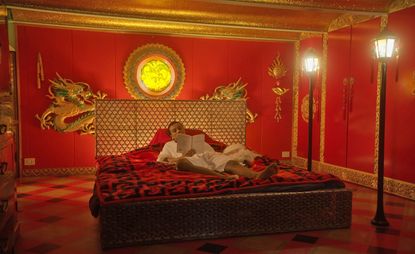
Virginia Woolf’s Orlando is a complicated figure. The gender-bending title character of her 1928 novel exists in a fascinating tension with both the politics of Woolf’s time, and the history that they move through – spanning centuries, continents, identities –and this is something that Paul B. Preciado is acutely aware of when discussing his own interpretation of Woolf’s work, the film Orlando, My Political Biography.
While Preciado is effusive in his praise and love of Woolf’s writing, he also acknowledges that Orlando is 'politically positioned in a certain context: of Virginia Woolf being of a certain class, of a certain imperial British moment'. He wonders if, in spite of this, Woolf herself was 'fighting against those elements of her culture'. Preciado describes this culture, and all of the ugliness it can contain – imperialism, racism, homophobia, misogyny – as the 'layers of our own history'.
This idea that Woolf’s novel contains layers of history also ties in with the potential for transformation and liberation that the title character experiences through their relationship to gender. In the film, Preciado’s narration acknowledges that Orlando’s instantaneous transition is 'not how one becomes trans', a line that’s revealing of his project throughout this ‘political biography’ – considering what it means to reckon with our past, and how it can help us navigate a present moment and possible future that feels increasingly perilous.
Preciado gives credit to the various 'Orlandos' that appear throughout the film, and the ways in which their own experiences are able to bring Woolf’s novel into a more contemporary context. 'Working on the colonial scene in Constantinople with [actor] Amir Baylly – with part of his family coming from Africa and having this experience of being constantly racialised – completely changes the ways in which you can adapt [this chapter].'
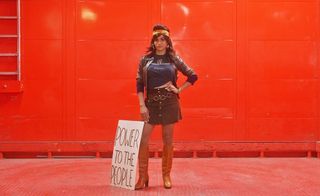
Kori Ceballos
The Orlandos in Preciado’s film come from diverse walks of life, across different races, gender identities, and age groups, allowing the film to present a multitude of ways to define trans-ness, understanding that there are multiple ways to be trans, and multiple ways to transition. Preciado reveals that, at first, the scores of actors auditioning for the film assumed he was looking for just one Orlando, although he says that he was never interested in 'just the unique experience of Orlando. Orlando, if its anything, is a radical multiplicity.' It’s through this 'radical multiplicity' that Preciado is able to create such a diverse tapestry of both history and contemporary trans life, from the lives of his Orlandos, to early modern trans figures like Christine Jorgensen and Coccinelle. These figures – and indeed, Woolf’s Orlando themselves – are invoked in a line from the film: 'To know that we are part of an erased history is to learn to honour the dead.'
There’s a temptation to think that all Preciado might be doing here is honouring the dead, offering up the affirmation that as trans people, we have always been here, but he seems to think of this as something of an easy way out. Preciado says that the film is 'honouring the dead but not [just] as a memorial of victims, because I think that’s very comforting for normative culture, it’s like “Oh, the memory of the victims, fine.” For me, the memory of trans lives that were impossible relies on those that are going to be possible in the future.'
For Preciado, this idea that transition is about possibility ties into what he sees as the audience of the film: 'kids or teenagers', a declaration that his distributors were initially 'horrified' about. According to the filmmaker, this reaction comes from the fact that 'the story of transitioning is supposed to be something that cannot be taught to kids, in case they imagine the possibility of transition is real. That being trans or non-binary is a real possibility.' He is adamant in offering as broad a definition of trans-ness as possible, insisting that doesn’t depend on dysphoria or being seen as 'sick'. Statements like this are impossible to ignore as we navigate a moment that feels precarious for trans people, as their right to exist as their true selves becomes the subject of debate and discussion, something that Preciado has encountered in his time making this film, even though he insists that this quote-unquote debate isn’t what the film is about: 'Sometimes people tell me, “Oh this is a film about The Trans Question”, as if this is a question. Well there is no trans question.'
Wallpaper* Newsletter
Receive our daily digest of inspiration, escapism and design stories from around the world direct to your inbox.
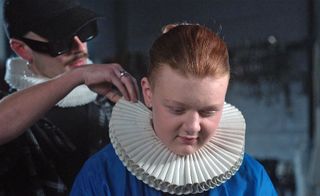
Ruben Rizza
Instead, what Preciado aims to do with this film is, in many ways, what Woolf initially did with her novel almost a century ago; showing the possibilities, in all of their multitudes, that trans-ness and transition can offer; he even reveals that 'transitioning was probably the best thing that ever happened to me'.
The film’s final scene, which can read as utopian, was heavily informed by the political realities faced by trans people. In the scene, a judge played Virginie Despentes provides new legal papers to each of the film’s Orlandos. When first making the film, Preciado wasn’t sure about this way of ending the film, thinking that it 'would be too conventional, because we don’t just want papers, we want to change the world'. But through the process of working on the film, and working with his Orlandos, the importance of these papers became clear: every day, problems with papers impacted the material lives of Preciado’s cast. 'And then I realised that the papers were just another book; its a piece of writing, its a piece of poetry. It's a ridiculous, violent poetry.' This is what gave the ending its final form, what Preciado calls a 'political exorcism'. He insists that this isn’t the end point, but rather 'the minimum requirement for life to be possible'. One can only imagine all of the possibilities that can come after this.
Orlando, My Political Biography is screened at Picturehouse cinemas
-
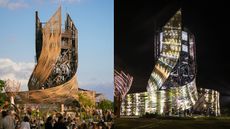 Bali welcomes Tri Hita Karana Tower, a hybrid sound and vision centrepiece
Bali welcomes Tri Hita Karana Tower, a hybrid sound and vision centrepieceTri Hita Karana Tower is launching at Bali's Nuanu City; designed by Arthur Mamou-Mani, it’s a new hybrid art-AI architectural landmark for the island
By Ellie Stathaki Published
-
 Lego opens its first Superpower Studios at Paris’ La Gaîté Lyrique
Lego opens its first Superpower Studios at Paris’ La Gaîté LyriqueIn collaboration with Lego’s new Global Play Ambassadors, artists Aurélia Durand, Chen Fenwan and Ekow Nimako, and overseen by Colette co-founder Sarah Andelman, Paris is the site of the first Lego Superpower Studios
By Jonathan Bell Published
-
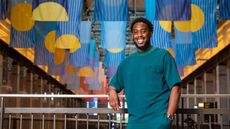 ‘If kids grew up going to London Design Festival they would learn so much’: architect Shawn Adams
‘If kids grew up going to London Design Festival they would learn so much’: architect Shawn AdamsIn the first of our interviews with key figures lighting up the London Design Festival 2024, Shawn Adams, founder of POoR Collective, discusses the power of such events to encourage social change
By Ali Morris Published
-
 The Substance may be grotesque, but it is not body horror
The Substance may be grotesque, but it is not body horrorThe Substance, Coralie Fargeat's sophomore feature film, has already been granted the moniker body horror, due its visceral imagery and mutations of the body
By Billie Walker Published
-
 New film, Hollywoodgate, finds out what really happened when the US left Afghanistan
New film, Hollywoodgate, finds out what really happened when the US left AfghanistanFilmmaker Ibrahim Nash’at’s Hollywoodgate follows Taliban soldier MJ Mukhtar and air force commander Mawlawi Mansour in the aftermath of America’s withdrawal in August 2021
By Zoe Whitfield Published
-
 Toys, fantasy and the US immigration system: inside Julio Torres' debut film, Problemista
Toys, fantasy and the US immigration system: inside Julio Torres' debut film, ProblemistaJulio Torres writes, directs and stars in Problemista – now on digital release – where the nightmare of US immigration is given a surreal spin
By Hannah Silver Published
-
 First Fraenkel Film Festival in San Francisco: what to see
First Fraenkel Film Festival in San Francisco: what to seeThe Fraenkel Film Festival, at the Roxie Theater in San Francisco, sees ten Fraenkel gallery artists choose films that impact their work
By Lauren Cochrane Published
-
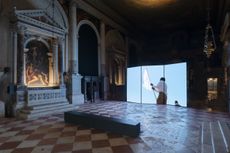 Enter the immersive world of film noir at a disused hospital in Venice
Enter the immersive world of film noir at a disused hospital in VeniceFondazione In Between Art Film returns to Venice with ‘Nebula’, by curators Alessandro Rabottini and Leonardo Bigazzi
By Amah-Rose Abrams Published
-
 Cannes Film Festival 2024 highlights: our verdict is in
Cannes Film Festival 2024 highlights: our verdict is inWhat to watch or not to watch – cut to the Cannes Film Festival 2024 highlights
By Sophie Monks Kaufman Published
-
 Cyber-noia, pornography, and liberation: inside the queer sci-fi of Shu Lea Cheang
Cyber-noia, pornography, and liberation: inside the queer sci-fi of Shu Lea CheangShu Lea Cheang's new film, ‘UKI’, exists in two worlds simultaneously: the real world of flesh and blood, and a strange digital landscape
By Sam Moore Published
-
 ‘What a Fantastic Machine’: new film explores the camera, pop culture and human behaviour
‘What a Fantastic Machine’: new film explores the camera, pop culture and human behaviourMaximilien Van Aertryck and Axel Danielson’s new film, ‘And the King Said, What a Fantastic Machine’, dissects the role of the camera in popular culture
By Zoe Whitfield Published